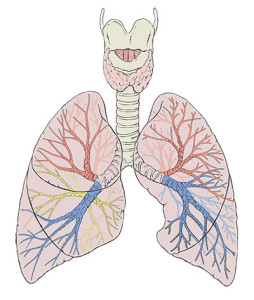
The theories of Chinese medicine suggest that each season relates to a different organ system. The Fall is the season of the Lungs. It’s the time of year when people are easily affected by environmental influences. Great changes are taking place in the weather and plant life around us. Some people refer to it as the “flu season.”
The lungs are called the “delicate protective organ,” because they are the only organ that comes into direct contact with the external environment. This can make them vulnerable to the environmental influences which can lead to colds, the flu, or allergies.
The lungs are also involved in the production of Wei Qi. Wei Qi is a similar concept to what Western medicine refers to as the immune system. Wei Qi provides the body with an “immune system-like” barrier that protects the body from harmful pathogenic factors that can enter into it, and which may eventually lead to illness and/or disease.
Healthy and strong lungs can enhance the proper functions of the entire body. Through an intricate process, the Lungs extract “pure essence” from the air we breathe, and combine it with the food we ingest to produce the Wei Qi. This immunity-like system is then circulated throughout the entire body, providing it with a first line of defense.
When the lungs are functioning correctly, we remain healthy, and potentially free from illness. But when our lungs become weakened or imbalanced, our body may not have the capacity to produce the correct amount of Wei Qi.
When this occurs, the stage for “catching” a cold, the flu or allergies is set. Weak lungs and Wei Qi can also lead to asthma, eczema, dry skin and other problems.
The lungs are negatively affected by many factors: an improper diet, emotional stress, unexpressed or long-held grief or sadness, inherited constitution, smoking, bad air or pollution.
The ancient classic text, Zhen Jing, states, “If the lungs function well, it can activate the flow of Qi, and nourish the whole body with Wei Qi, as rain nourishes young crops.” Proper lung function is necessary to keep us healthy and to help ward off illness and disease.
S.A.D. Times Ahead?!
 The shorter days and changes in weather may throw many of us off balance, affecting our mood and behavior. In fact, ten percent of us may be diagnosed with a common problem called Seasonal Affective Disorder (S.A.D.).
The shorter days and changes in weather may throw many of us off balance, affecting our mood and behavior. In fact, ten percent of us may be diagnosed with a common problem called Seasonal Affective Disorder (S.A.D.).
People suffering from S.A.D. may have a few, or all symptoms present; changes in appetite, weight gain, cravings for sweet and starchy foods, a tendency to oversleep and have difficulty in waking, fatigue, low energy, decreased libido, aches, pains, and difficulty focusing.
These symptoms can be severe enough that our lives will be completely disrupted. We may even try to avoid social situations and become a recluse this time of year.
Traditional treatments involve mood altering drugs. While they may be effective, drugs can also have severe side-effects. Instead, many people choose to use natural remedies to combat S.A.D. such as exercise, herbs and light therapy. Light therapy involves sitting in front of a light unit equipped with specially designed bulbs. These bulbs duplicate the normal light spectrum of the sun on a cloud-free spring day. Since lack of sunlight is a factor in S.A.D., this therapy works quite well.
Light therapy requires an exposure to these special bulbs for at least 30 minutes a day. But, be cautioned, just like the sun, you can’t look directly into the light. There are many resources on the internet for this.
Another approach is to keep body and mind balanced with acupuncture care. Bodies can be easily thrown off balance with just about everything we do in life. The seasons have a direct influence upon the health of our mind and body. Acupuncture treatments can rebalance body systems, calming the mind, lifting the spirit and turning on our internal light switch!
Just another reason to keep your body, mind and meridian system in tip top shape!
